David Rosenthal got his first synth (a Roland SH1000) when he was 15 years old, having been inspired by Tomita's interpretation of Mussorgsky's Pictures at an Exhibition. In the 80's he attended Berklee College on Music and studied synthesis formally as one of the earliest students in the college's synth program. At the time, there weren't many people who could program a hardware synth. In addition to his career as a composer/touring musician he programmed synths for Dream Theater on their Change of Seasons album.
His mastery as a player and arranger is only matched by his ability to grasp cutting edge technologies, and integrate them into all the aspects of his music. This, combined with high level of professionalism and drive, has opened many doors during his career. A list of those can be found here.
He hasn't written a huge hit song, or become a household name, but David has had an exceptionally successful career as a musician by working hard, and being prepared. Musical talent (and David has plenty of that) is not the only requirement. You have to be ready when the opportunities arise.
You're like a commercial synth historian. What inspired you to start using synthesizers?
Tomita!! I went to music camp at Glassboro State College when I was 14, and the instructor played his Pictures at an Exhibition album as an example of what people can do with synthesizers. I was blown away. It was all monophonic synths in those days so he did it one note at a time. I was amazed. Most of his records were done in the early '70s, and sonically hold up to this day.
How did you get your first gig as a touring musician?
I was a student at Berklee College in Boston, in my final semester when I found out Ritchie Blackmore was looking for a new keyboard player for Rainbow. I sent him a tape of the classic piano recital that I had done my sophomore year, and a tape of my cover band at the time.
A cover band?
The band was called Masterpiece and we were covering Kansas tunes, Yes, and The Cars. We tried to do a little "Prog" whenever possible. The Rainbow audition was a crazy cattle call, like 50 guys. I brought my Farfisa organ, a Rhodes, a Roland P-505 string synthesizer and my very first synth - a Roland SH1000.
I get there and they're like, "No, Ritchie wants you to play on his stuff", which turned out to be a Hammond B3, a Clavinet and a Minimoog. I knew in theory how to work a B3, but I'd never played one, and I knew in theory how to use a Minimoog, but I'd never played one, but I managed to make the short list for a callback. The next morning, I called every Sam Ash around New York until I found out who had a Minimoog on display. I went to the store and sat with a pair of headphones, learned how to use it, and came up with some patches. So, when I went back for the second audition I was getting around it.
How important has your technical facility with synthesizers and tech products been, as opposed to your musical skills?
I'd say that both were really important. All through my career having a technical background has helped me. Of course music comes first, but as a keyboard player the technical side is as important as the playing. If I wasn't a good player, I wouldn't get the gig, but being able to dial in my own sounds exactly to my touch gives me an edge.
Did you finish your degree at Berklee?
I had two classes left, but all of my teachers said, "Take the gig, and good luck." I later finished through correspondence, so I did graduate.
Self-promotion is critical to the success of anyone in the arts. Did you learn about that at Berklee, or from other musicians?
I learned it by necessity. It's weird to be your own product but I love what I do and that's it. I'm not doing this for fame or adoration. I need to make a living like anybody else, so I just kind of figured things out as I went. I'm fortunate that I did figure things out because I see a lot of my peers have never gotten off the ground, even though they were brilliantly talented musicians. It's a really competitive business.
I'd like to tell you it was some sort of plan, but I was just figuring things out as I went. I was fortunate to get the opportunity to be in a big band like Rainbow when I was young, and I didn't go out there and act like a crazy guy on tour. I was watching and learning. After Rainbow, one thing led to another, which led to another, and I would keep reassessing and figuring it out.
Your setup for the Rainbow gig was the Organ, Clavinet, and Moog...?
Yes, I kept my Roland P-505 and I added an Oberheim OB-Xa, and DSX sequencer, which was the latest thing at the time. I had to save the patches onto a cheap little Radio Shack cassette tape player by recording the sync tone. I still have the tape player and all of those backup cassettes from Rainbow in case I need them again (laughs).
How did you use the DSX during the live show?
I used it for my keyboard solo. I had five minutes to myself every night in Rainbow. Ritchie said, "Do whatever you want. I'm going to have a drink." Everybody would leave the stage. I used the DSX on that, and I played an excerpt from Carmen. The crowd loved it...
Before you used a computer for music, had you used a computer for anything else?
My dad had a really early PC and I used a word processor on that, so I thought a computer would be a good thing to have. When I was on the road with Cyndi Lauper in 1986 I had extra time between gigs, so I decided to get a Mac Plus and learn how to use it. I got an Opcode DX-TX editor, version 1. I was making music with it in a fairly short period of time, and then there was no turning back.
I wasn't using it professionally yet, but I was learning it and doing stuff aside from the tour. Once a tour is up and running, that's it.. You have to freeze the whole thing and you complete the tour. Even if the gear goes obsolete during the tour you've got to still use it because it's already set up for that tour. Because of this it would be awhile until I integrated the computer into my live setup.
I noticed the Yamaha TX-816 in your rack. So, the Opcode editors would have been extremely helpful...
The DX7, even as cool as it was, sounded thin, but being able to stack a bunch of them sounded like a really big synth. So, the TX-816 made sense to me right from day one, but it was a pain in the butt to program because you had to do it from the DX7 which was already a pain to program with the tiny little LCD display.
But with the DX-TX editor, I was like wait a minute... I can really dial this in now and get all of my own sounds and keep libraries of sounds. That was the beginning of using modules and MIDI controllers. I was able to tame the beast.
In the beginning, there were so many idiosyncrasies to get MIDI to work across your rig. I eventually got my OB-Xa retrofitted with MIDI. Then I got a DX7 and MIDI'ed it to my Memory Moog but I didn't want them connected all the time. So I had my Memory Moog modified with an on/off MIDI switch so that sometimes they would play together and sometimes not. I was still organizing things in my brain, how am I going to use this?
How'd you get that Cyndi Lauper gig?
I heard about it so I called and got an audition. It was weird, because for that gig she was auditioning the whole band at the same time. There were tons of people all around the room. I said to her manager, "How do you audition a whole band at the same time? How is this going to work?" He said, "What we're going to do is get the first group of guys up there, one on each instrument, and whoever she likes stays, and whoever she doesn't like, we keep auditioning." So, I said, "Well if that's how you're going to do it, I want to go first." And he said OK. It went well and nobody else got to play, at least for the keyboard chair.
Good thinking...
It was a people skills moment (laughs). But, I played the parts right as well. When people say learn the song, to me that only means one thing. Learn it. I come in and I know it and I've got all of the sounds exactly.
Robert Palmer was next. That was a completely different style of music.
Totally, but it was still pop.
Who played the keyboard parts on that record?
I think a lot of it was Jeff Bova. He also did a lot of the playing on Cyndi's True Colors album. I met Jeff on the day of my audition for her. So, I'm doing my stuff and Cyndi kept looking at him to see what he thinks and he's like, "This guy has got it down." He was also there to give the sounds to whoever got the gig, but I didn't need them. I had listened to the records, and already replicated them.
What project are you working on now?
I'm working with Ethan Bortnick, a child prodigy, who plays piano and sings. When he was 12 we did a PBS special called The Power of Music and I was the musical director. He performed with a 46-piece orchestra and a 100 choir, a band, backup singers, and he just goes up and fronts the thing like he's an adult performer. It's been aired over 4,000 times nationwide, and he has raised more money for the pledge breaks than any other artist, including Elton John and Barbara Streisand. It's been immensely successful, so we recently filmed a new one for him called Generations of Music, also with an orchestra and choir. He's 16 now.
What are you using now on tour with Billy Joel?
I have on the road my A and B rig. They're two redundant systems running at the same time. Here at home I have a C rig which is exactly identical, in a skeletal form, to what I use on the road. So, I can program stuff here if Billy wants to add a song or something that we've never done before, or if I need to edit something, I do it here. I create in MainStage, put it on a flash drive and then transfer it at the next gig. I only get to see my gear at sound checks cause it lives in a truck all of the time. I get my gear home maybe once a year.
Has your ability to read music been an important skill throughout your career?
It's been a huge thing for me. I find that I have a deeper understanding of music because I read music. I know many brilliant musicians who don't read, so I don't think it's a prerequisite. But for me it makes sense. When I joined Billy's band I had two weeks to learn 55 songs. There was no way I was going to memorize everything in that amount of time. I could remember the verses and choruses because they repeated, but for the bridge or other sections which happen only once I'd make little cheat sheets and tape them all over my keyboards. Being able to read and write music was a big help for that. It's also important as a musical director to be able to write charts for the band, and as an orchestrator reading music is essential.
What aspects of your personality have most contributed to your career in music?
I would say focus is an important thing, and I'm patient. I will spend an inordinate amount of time preparing my sounds so that I can go on stage and hit one button. When I'm going after something it's irrelevant how many hours it takes me to get it. I will work at it until I get what I'm after.
Being Billy Joel's music director requires a combination of people skills and musical understanding of his instinct as an artist and of his music. I know the show inside and out, not just my parts, but all the other parts too. If something isn't sounding right I know how to go about getting it musically, and how to get the right performances out of the musicians. In his band I'm fortunate to work with great musicians. Everybody is really good at what they do.
Of all of the synthesizers over the years, what was your favorite sonically, or what could you say what was your favorite to mess around with?
I love certain synths because of their personality of sound, their character, and there's a lot of them over the years. The OB-Xa is amazing, the Memory Moog, the Minimoog, the DX7 has its own character. The Roland D-50 and the MKS70 and JD800. I could go on and on. I couldn't pick a favorite out of those. If I was stuck on a deserted island with a power supply, what would I have? All of them. I couldn't live with any one of those. Finding a gig on a deserted island though would be tough...
You have used so much cutting-edge stuff over the years. Has it ever got in the way? Do you have an anecdote where you realized, "Oh my god, I was supposed to make music and I haven't because my gear isn't behaving."
Well, I try not to be the first guy on my block with a new technology. I like to mess around with new stuff, but I can't go out with a major artist and stand in front of people in an important session or a big concert and have a train wreck.
The first time I was going to use MainStage in a big show was when we did the 12.12.12 Hurricane Sandy benefit concert with Billy. There were only about 2 billion people tuned into it, so no pressure (laughs). We were only going to do five songs, and we were going to have some rehearsals for a change, so I thought this would be a good chance to try out this new system. So, I programmed up 15 songs (just in case), set everything up, dialed it all in, and when I went to go play the songs the system couldn't handle it because I was still using Firewire and conventional hard drives. I would play a big thick chord and it just couldn't stream fast enough to keep up. So, for that gig I had to go back to my Kurzweil. A few months later Thunderbolt and SSDs came out, and then all of a sudden everything I had done worked perfectly. And that was when the door opened for this new generation of technology.
Other than Tomita, are there any other people have you admired for the way they use synthesizers?
Rick Wakeman, Keith Emerson, Chick Corea, and Kit Watkins from Happy the Man. They all had big influences on me.
You have perfect pitch. Does it ever get in your way? Like when you hear the thing, that's not the right note.
It's a blessing but it can also be a curse in a situation like in Billy Joel's band where he's dropped the keys of some of the songs. My ears won't let me play a transposed keyboard, so I have to re-learn the tunes.
When did sampling come into the picture for you?
I started with the Emulator 1 in the Rainbow days, but I wasn't making my own samples at that time. Then on Cyndi Lauper, I had an Emulator 2, and I think I had made a couple of samples—just a sound effect or something weird, just to do it. On Robert Palmer, I had an FZ10 Casio Sampler, and that's when I started making my own samples.
Nowadays a lot of the sounds I play were sampled by Auto-Sampler from synths I have used over the years.
So you could recreate them without taking the synth out of mothballs of course...
Yes, and also to protect the thousands of hours of programming I have done. I had so many sounds dialed in - to a science. Why not capture it? I'm still using all the same sounds but now they live in MainStage on my computer. And they sound ten times better because now that everything is digital the noise floor is practically non-existent.
How long did that whole process take?
It took a little over a year. I'd do 16 velocities and I'd do them without loops. Each sample is 10 or 12 seconds, so each patch would take an hour or two to auto sample. Then once it was done, I had to go back and make sure it played right. If it didn't I would make adjustments and then redo the autosample. Billy was taking time off. He said that he was never going to tour again, but I took a gamble that he would change his mind one day and it worked out. It was a big project but I'm using it now and we're in our 5th year of touring on this run.
What do you use the most now?
For playing live I use MainStage and the associated plugins. I use EXS24 for samples, mostly because of its efficiency in MainStage. I also use Kontakt and the whole Komplete collection.
What about for synth sounds?
Arturia. Their Minimoog sounds phenomenal. I love Omnisphere. If I need something that I've never been heard before, I go there as a starting point, and then I tweak it.
So the journey began with Tomita...
Yea. When I was at Berklee, and Dave Mash was my synth teacher, I had to do a final project. So I recorded a Debussy piece called L'isle Joyeuse. I had an Arp Odyssey and my Roland SH-1000 and a Rhodes and I borrowed some other keyboards from people in the dorms. It was all monophonic synths in those days so I layered up 104 tracks using two 4-track machines bouncing back and forth, like I thought Tomita would do it, one note at time. It was quite noisy at the end, but it was all there.
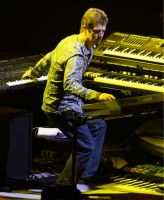 When I finished it I mailed a cassette to Tomita, and when I went to Japan my first time with Rainbow I asked the promoter to set up a meeting with him. And he made it happen. Tomita remembered my tape and said he was really impressed with it. He invited me to his studio and showed me his big modular in this small room where he did all of his records. I asked him all kinds of questions. "So, like this one movement of the Firebird Suite that blows me away, how long did that take you?" and he goes, "That three minutes of music took me about a month." He just sat in this room by himself and did it. It's fascinating.
When I finished it I mailed a cassette to Tomita, and when I went to Japan my first time with Rainbow I asked the promoter to set up a meeting with him. And he made it happen. Tomita remembered my tape and said he was really impressed with it. He invited me to his studio and showed me his big modular in this small room where he did all of his records. I asked him all kinds of questions. "So, like this one movement of the Firebird Suite that blows me away, how long did that take you?" and he goes, "That three minutes of music took me about a month." He just sat in this room by himself and did it. It's fascinating.
I kept in touch with him, and many years later when I was with Billy Joel I invited him to the show, and he came. I couldn't believe it. I got a chance to really chat with him a lot more, and show him my rig. After the show, I said to him, "what did you think?" And he goes, "Your sounds are great." And I was like, that's it. I can die now.
Several years later he was teaching at a master's program at a university and he invited me to come and speak to his class. He was a really great guy, and very open about how he created things and what he did.
Well that must have been a proud moment...
Yea, it was really cool.
For a picture album of David career check this out.
If you work hard enough you too may be able to play Wrigley Field in Chicago
Waiting for the show to start at Arco Arena in Portland


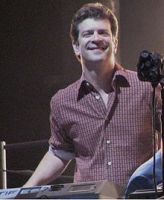
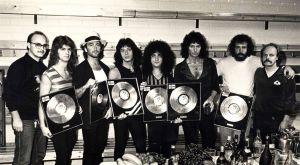
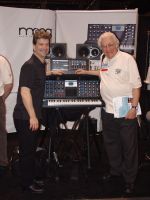
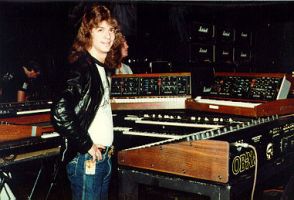
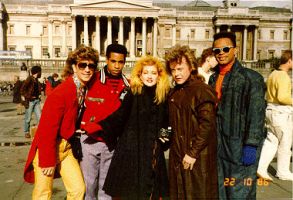
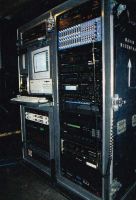
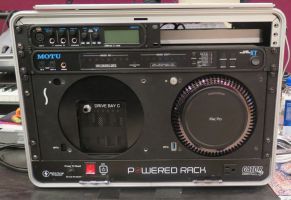
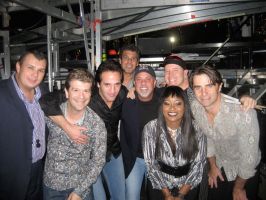
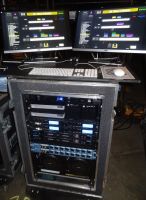
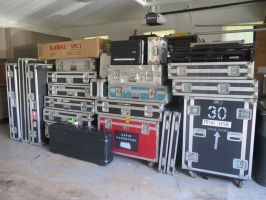
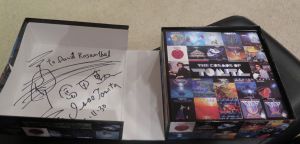
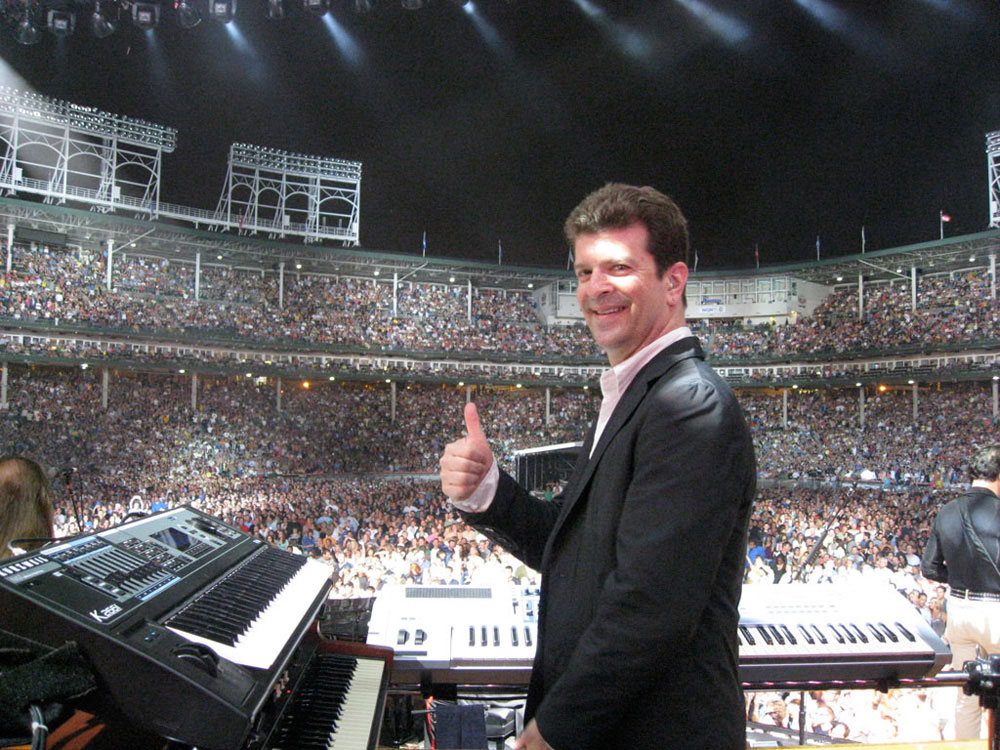
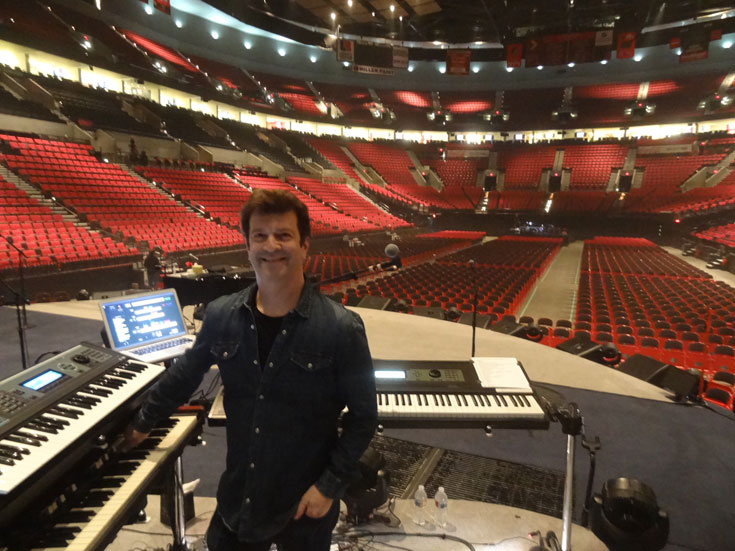
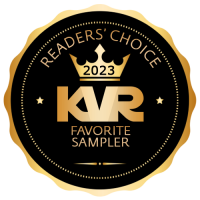
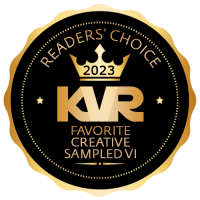

 Other Related News
Other Related News
